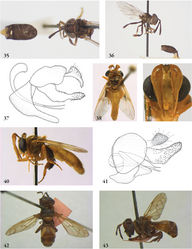Carreramyia
| Notice: | This page is derived from the original publication listed below, whose author(s) should always be credited. Further contributors may edit and improve the content of this page and, consequently, need to be credited as well (see page history). Any assessment of factual correctness requires a careful review of the original article as well as of subsequent contributions.
If you are uncertain whether your planned contribution is correct or not, we suggest that you use the associated discussion page instead of editing the page directly. This page should be cited as follows (rationale):
Citation formats to copy and paste
BibTeX: @article{Reemer2013ZooKeys288, RIS/ Endnote: TY - JOUR Wikipedia/ Citizendium: <ref name="Reemer2013ZooKeys288">{{Citation See also the citation download page at the journal. |
Ordo: Diptera
Familia: Syrphidae
Name
Carreramyia Doesburg stat. n. – Wikispecies link – Pensoft Profile
- Carreramyia van Doesburg, 1966: 93. Type species: Microdon megacephalus Shannon, 1925: 213, by original designation.
Description
Body length: 5–8 mm. Yellowish brown or black flies, tergites sometimes yellow with dark vittae. Mimics of stingless, Trigona-like bees (Apidae: Meliponini), due to the brush-like pilosity of the hind tibiae and the more or less triangular abdomen. Head wider than thorax. Face more or less straight in profile; wider than eye. Lateral oral margins not produced. Vertex strongly produced. Occiput ventrally narrow, dorsally widened. Eye bare. Eyes in male not approaching each other; separated over distance much wider than antennal fossa. Antennal fossa about as high as wide. Antenna longer than distance between antennal fossa and anterior oral margin. Antenna inserted below dorsal eye margin; basoflagellomere at least four times as long as scape, bifurcate in male, unfurcate in female; bare. Postpronotum pilose. Anepisternum without sulcus; continually pilose on dorsal half, bare on ventral half. Anepimeron pilose on dorsal half, bare on ventral half. Katepimeron convex; bare. Wing: vein R4+5 without posterior appendix; vein M1 perpendicular to R4+5 and M; crossvein r-m located close to bm-cu. Abdomen more or less triangular, with tergites 3 and 4 narrower than tergite 2. Tergites 3 and 4 fused. Sternite 1 bare or pilose. Male genitalia: phallus straight, furcate near apex; hypandrium with bulb-like base and basolateral bulges; epandrium without ventrolateral ridge.
Diagnosis
Hind tibia widened and with long, brush-like pilosity. Vein R4+5 without posterior appendix. Vertex strongly produced but not shining and convex. Basoflagellomere at least four times as long as scape, bifurcate in male.
Diversity and distribution
Described species: 2. Only the type species, Carreramyia megacephalus (Shannon, 1925), is known from more than one specimen (Panama and Costa Rica). The other species was found in Peru. Descriptions of two additional species from Peru and Surinam are in preparation by the first author. Apparently the genus is widespread in the Neotropical region.
Taxon Treatment
- Reemer, M; Ståhls, G; 2013: Generic revision and species classification of the Microdontinae (Diptera, Syrphidae) ZooKeys, 288: 1-213. doi
Images
|
